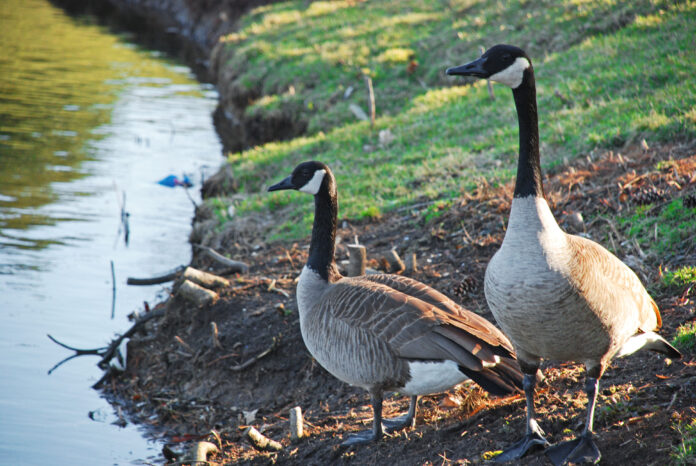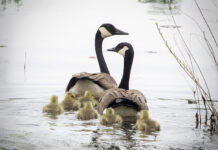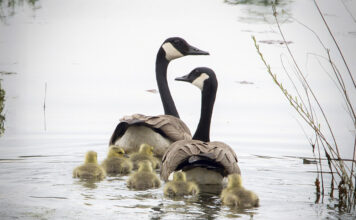Spring has officially sprung on campus, which means sunshine, greenery, and hanging out between classes on the grassy hills. It also means gaggles of geese will be hanging out right there with you. Here are some fun facts and warnings about the birds we share our campus with.
Canada geese are among the most common in Michigan, and likely what you’ll see when strolling around campus or daydreaming while staring out the window.
They prefer to gather in places with low vegetation and near a body of water – the lovely Spring Lake on the North Avenue campus is the perfect spot for them to spend time.
Geese have impeccable vision – they can see in much finer detail and at a greater distance than humans, see UV light, control each of their eyes independently, and literally sleep with one eye open, which would be helpful for students in those early morning classes.
They’re gaggle-oriented creatures. More often than not they mate for life, migrating and staying together no matter where the weather takes them. They can pick out their own siblings from a gaggle of other nearly identical geese, and baby goslings even start communicating with mom and dad while they’re still in their eggs.
It is because of this that they get a reputation for being violent – they will fiercely protect their family from any perceived threats. But they’re not afraid of you – in fact, humans feeding them desensitizes them, which can either mean you’re in the clear or you’re even more likely to be attacked for taking a step too close their babies.
They often feast on various roots, plants, seeds, and berries with a nice treat of the occasional insect or small fish. Contrary to popular belief, however, they should not eat things like bread, crackers, popcorn, or chips – filling up on these empty calories keeps them from seeking out other more nutritious options and become malnourished.
Feeding geese causes them to overcrowd the areas they expect food from, so you should probably refrain from feeding the geese on campus altogether to avoid there being more geese (and goose poop) than there are students.
Geese are amazing creatures for us to share our space with – just be sure to leave them be, and they should do the same for you!
Works Cited
“10 Facts about Geese.” FOUR PAWS International – Animal Welfare Organisation, 9 Apr. 2019, www.four-paws.org/campaigns-topics/topics/farm-animals/10-facts-about-geese
Barnes, Amber. “Fun Facts about Geese.” The Open Sanctuary Project, 13 Mar. 2023, opensanctuary.org/fun-facts-about-geese/.
“Canada Goose.” Audubon, 28 Feb. 2024, www.audubon.org/field-guide/bird/canada-goose.
Please Don’t Feed the Geese, www.wdm.iowa.gov/government/public-services. Accessed 11 Apr. 2024.
“Why Are Geese so Aggressive?” Varment Guard Wildlife Services, varmentguard.com/blog/why-are-geese-so-aggressive. Accessed 11 Apr. 2024.























